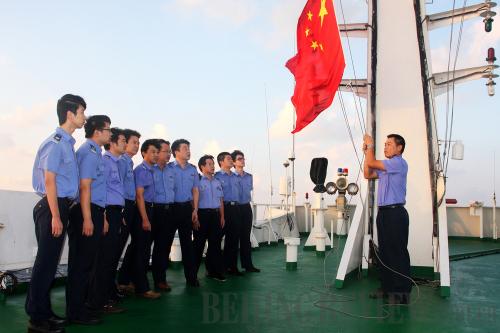|
 |
|
ON PATROL: Chinese fishery officials attend a national flag raising ceremony on October 7 aboard a patrol ship on a law enforcement mission to the Diaoyu Islands (DONG JUN) |
Aside from attempts to ease tensions with China, the two Japanese parties seem to be attaching more importance to warming relations with South Korea.
Ex-Foreign Minister Seiji Maehara, an iconic figure among anti-China Japanese politicians, was named as national policy minister of the Noda cabinet. Critics say Maehara will undoubtedly be a key figure in the new cabinet and play an important role in foreign affairs. Maehara has long advocated an alliance of Tokyo and Seoul to pin down Beijing.
A red hot economy with frigid political relations has long been a cliché to describe the Sino-Japanese relationship. Since the "island-buying" farce, the phenomenon seemingly came to a stop. Since Chinese people's spontaneous boycotts of Japanese products, once popular Japanese brands have suffered in China. Japanese automobile manufacturers are bearing the brunt of the island dispute.
Reports showed that Japanese automakers saw sharp declines in Chinese sales in September. The September sales of Mitsubishi in China plummeted to 2,340 vehicles, down 62.9 percent from September 2011, and 33 percent lower than 3,495 vehicles in August. Mazda sold 13,258 vehicles, off 35 percent from a year earlier and 20 percent below the 16,539 sold in August. Toyota's sales in September were half of August levels. During an already gloomy market, it also temporarily ceased export of its high-end car Lexus to the Chinese market.
The number of Chinese tourists visiting Japan also declined sharply. Japan Airlines recently said it had passenger cancellations for 19,500 seats on Japan-China routes in the September-November period.
Shi of the CIIS said the deteriorated bilateral relationship would inevitably affect bilateral trade and economic relations. If the situation continues to worsen, bilateral political relations would go from cold to confrontational; and red hot economic relations would freeze up.
Since 2002, Japan has been China's largest trading partner for nine straight years. China has also exceeded the United States to become Japan's largest trading partner. The trade volume between the two countries has accounted for one fifth of Japan's total trade volume. Japan's trade dependence on China is about 20 percent while China's trade dependence on Japan is about 11 percent.
The impact of Japan's "island purchase" on bilateral trade is on a continual rise. Shi said if the trend continues, Japan could lose the Chinese market.
Jin Baisong, a researcher with the Chinese Academy of International Trade and Economic Cooperation (CAITEC), said Japan's economic circles have a role to play in improving the crucial China-Japan relationship. Jin called on Japan's economic elites to shoulder the mission of healing Sino-Japanese relations.
"If Japanese businesses hope to save the declining state of Sino-Japanese political and economic relations, and truly care about the damaged auto deals, they need to take action," Jin said.
Critics say the ripping fallout from the Diaoyu Islands dispute between the world's second and third largest economies would have global economic consequences.
The combined economies of China and Japan account for one fifth of the world economy while the two countries hold 40 percent of the world's foreign exchange reserves. Deterioration of bilateral relations would affect the policy coordination and normal operation of the global economy, said Mei Xinyu, an associate research fellow with the CAITEC.
Zhang Monan, a research fellow with China's State Information Center, said chain reactions of the territorial disputes stirred up by Japan not only made Sino-Japanese economic relations suffer but also struck a blow to China's supply chain in Asia and the world economy.
Since the outbreak of the international financial crisis, regional cooperation within Asia became aimed at offsetting the adverse effects of sluggish Western market. However, the process was hindered by Japan's island "purchase."
Zhang said the Asian supply chain is one of the most important links of the global economic cycle. China and Japan are the two largest intermediate product suppliers. Japan is also an important intermediate product supplier for China. The dispute would severely affect Japan's intermediate product exports to China and eventually cause a global chain reaction.
Amid tensions between China and Japan, Chinese central bank governor Zhou Xiaochuan and Finance Minister Xie Xuren were absent from the IMF-World Bank annual meeting held in Tokyo this month. Meanwhile, the four leading Chinese state-owned banks, including the Industrial and Commercial Bank of China, the world's largest lender by market value, were also missing from the world's top financial conference, arousing much concern.
The IMF worried the absence of major Chinese banks that have a significant influence on international finance would reduce the significance of the annual meeting.
"The dispute has taken a toll on the world economy. The absence of big Chinese banks from the IMF-World Bank annual meeting is a major sign," Mei said.
The forecast for global economic growth in 2012 was downgraded to 3.3 percent in the World Economic Outlook that was unveiled at the event. The IMF also lowered the growth forecast at the beginning of October for both China and Japan by 0.2 percentage points from its projections in July. The forecast for China stands at 7.8 percent, and that for Japan stands at 2.2 percent.
Zhang said the negative effect of Japan's misdeeds would manifest gradually and would worsen an already weakened world economy.
IMF Managing Director Christine Lagarde also warned that the world could not afford to have the two countries distracted by the islands. "The current status of the global economy needs both Japan and China fully engaged," she said.
| 